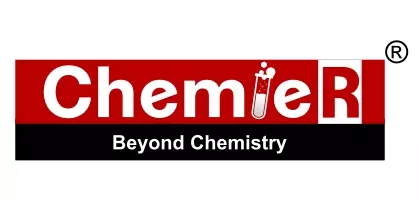Buy Potassium Hydroxide ACS (1310-58-3) MF: KOH | MW: 56.11. Get High Quality Potassium Hydroxide ACS (1310-58-3) from ChemieR.
Potassium hydroxide ACS is a strong, inorganic base that appears as a white solid. Its chemical formula is KOH. On a commercial scale, it is synthesized by the electrolysis of potassium chloride. It is soluble in water, forming a strong alkaline solution. In its pure form, potassium hydroxide is odorless, but it can absorb carbon dioxide from the air, leading to the formation of potassium carbonate and the release of heat. Potassium hydroxide is a versatile reagent used in the synthesis of various chemicals, including soaps, detergents, fertilizers, and pharmaceuticals.
ChemieR offers a variety of high purity salts and solutions of alkali metals, alkaline earth compounds, perchlorates, heavy metals, rare earths, transition metals, silver/precious metals, and triflates. ChemieR covers wide range of inorganic chemicals, specializing in low moisture and low trace metal grade materials.
ChemieR is innovative and unique product range in laboratory chemicals which includes organic reagents, inorganic reagents, and solvents. Order from our ChemieR brand to meet your budget whilst not compromising on the quality.
In-addition ChemieR also distributes in numerous Laboratory Supplies, Chemicals, Equipment, Instruments, Reagents, Standard Solutions, Buffers, Biological Stains & Indicators and many more, for more information please browse our website (https://chemiereagents.com) or email us sales@chemiereagents.com we will be happy to help you. All ChemieR Products are exclusively distributed by Dawn Scientific Inc (https://dawnscientific.com)
Application :
- Potassium hydroxide serves as a strong base in many organic synthesis reactions. It is used in the production of a wide range of organic compounds
- Potassium hydroxide is utilized for neutralizing acidic substances in chemical processes.
Benefits :
- It is use as a pH regulator.
- Gives accurate and reproducible results in laboratory experiments and analyses.







Reviews
There are no reviews yet.